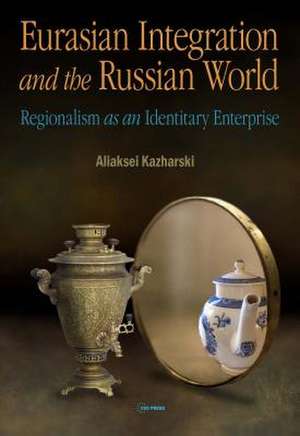Eurasian Integration and the Russian World
Autor Aliaksei Kazharskien Limba Engleză Hardback – 9 apr 2019
This volume examines Russian discourses of regionalism as a source of identity construction practices for the country's political and intellectual establishment. The overall purpose of the monograph is to demonstrate that, contrary to some assumptions, the transition trajectory of post-Soviet Russia has not been towards a liberal democratic nation state that is set to emulate Western political and normative standards. Instead, its foreign policy discourses have been constructing Russia as a supranational community which transcends Russia's current legally established borders.
The study undertakes a systematic and comprehensive survey of Russian official (authorities) and semi-official (establishment affiliated think tanks) discourse for a period of seven years between 2007 and 2013. This exercise demonstrates how Russia is being constructed as a supranational entity through its discourses of cultural and economic regionalism. These discourses associate closely with the political project of Eurasian economic integration and the "Russian world" and "Russian civilization" doctrines. Both ideologies, the geoeconomic and culturalist, have gained prominence in the post-Crimean environment. The analysis tracks down how these identitary concepts crystallized in Russia's foreign policies discourses beginning from Vladimir Putin's second term in power.
Preț: 752.20 lei
Preț vechi: 976.89 lei
-23% Nou
143.93€ • 150.68$ • 119.10£
Carte tipărită la comandă
Livrare economică 05-19 aprilie
Specificații
ISBN-10: 963386285X
Pagini: 300
Dimensiuni: 162 x 236 x 18 mm
Greutate: 0.43 kg
Editura: CEU EDUCATIONAL SERVICE NON-PROFIT LLC
Notă biografică
Aliaksei Kazharski is lecturer at the Faculty of Social and Economic Sciences, Comenius University, Bratislava.
